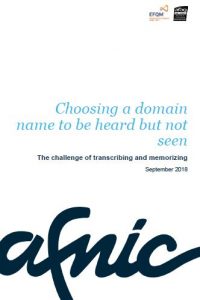
A few years ago we called upon Olivier Mokaddem, founder of the Human Sciences strategy agency, Fast & Fresh, and his team of Cognitive Psychologists at the Epsylon Laboratory of Montpellier 3 University to study in a scientific way the way domain names were visually memorized. The study carried out at the time provided us with 8 tips for choosing the right domain name. Given the unprecedented nature of the study in the domain name industry, it seemed interesting to us to extend the study to auditory memorization in order to supplement the results previously obtained on visual memorization.
Once again, Afnic turned to Fast & Fresh, who assigned this task to one of its Cognitive Psychology Research Engineers. The idea was to identify the keys to memorizing, and especially transcribing, a domain name when it was heard (for example during a radio advertisement) without having been read.
The experiment involved 30 participants, headphones on the ears, to whom we submitted several lists of domain names based on 3 main variables of analysis: the type of names (words vs. pseudo-words), the length of the names (short vs. medium vs. long) and the regularity of the spelling based on the sound (regular vs. irregular). The purpose was to measure the ability of participants to transcribe what they had heard in their earphones.
The results of this experiment allowed us to partially validate 3 hypotheses:
- The meaning of words: words are better memorized than pseudo-words,
- Compliance with existing codes: names that are written as they are heard are better transcribed than words with irregular spelling but not especially better memorized. We also noted that long words are generally better retained than short words, regardless of their regularity.
- The length of words: regular words of 5 or more letters (medium and long) are transcribed with fewer faults than short words (3 or 4 letters).
Based on these results, we can provide some practical advice for the use of a domain name in terms of auditory memorization, especially in the context of advertisements broadcast on radio:
- Domain names formed with an irregular word must remain as short as possible.
- Give preference to words that are written simply and if possible “as they are heard”.
- For long domain names, use regular spelling.
- If your domain name is a pun, let your listeners know.
- For words with a complex or irregular spelling, do not hesitate to contextualize, explain, translate or even spell them depending on the case.
About Fast & Fresh
Fast & Fresh is a Strategy in Human Sciences agency founded in 2009 in Paris.
It consists on the one hand of the National Laboratory of Cognitive & Social Psychology whose work involves understanding consumer behavior in depth, especially on issues that are not usually accessible with declarative tests.
On the other hand it has a Strategic Commando combining broader and more senior skills than the usual skills in order to intelligently face the main challenges in innovation.
Fast & Fresh focuses on e-commerce, luxury, gaming & experiential and socio-environmental topics.
Finally, Fast & Fresh seeks to help brands understand the needs of users in order to put customer relations back on the right track.
The task of the agency is to emancipate both users and brands. Endorsing, by conviction, the Psychologists’ Code of Ethics, we do not practice Neuromarketing.





